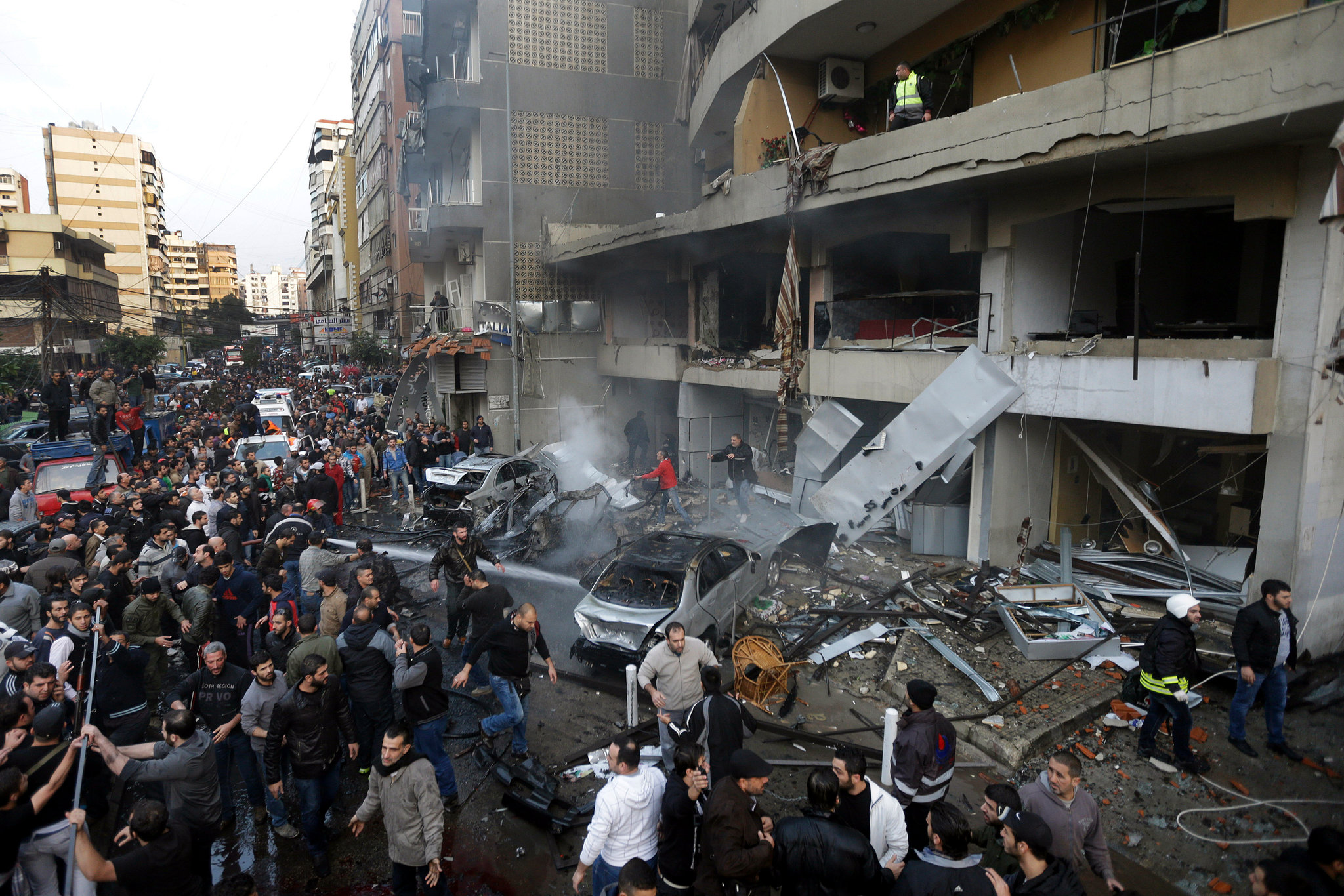


More than 90,000 people have been displaced in Lebanon as a result of Israel's military strikes, with 51 people killed in recent air strikes. This comes as Hezbollah launches rockets towards Tel Aviv and tensions between Israel and Lebanon continue to escalate. As countries around the world urge their citizens to leave the area, aid workers report that those fleeing the violence are facing difficult conditions on the road.
Lebanon-Israel Conflict: Escalating Tensions and Humanitarian Crisis
The recent military strikes between Israel and Lebanon have displaced over 90,000 people and claimed the lives of 51 individuals. The conflict, which escalated with Hezbollah launching rockets towards Tel Aviv, has sparked international concern and prompted countries to urge their citizens to evacuate the area.
Background:
The conflict between Israel and Lebanon has its roots in the ongoing Israeli-Palestinian conflict. Lebanon has been a refuge for Palestinian refugees since the 1948 Arab-Israeli war, and Hezbollah, a Lebanese Shia Islamist political party and militant group, has played a significant role in the defense of Lebanon's southern border with Israel.
In 2006, a month-long war between Israel and Hezbollah erupted, resulting in the deaths of over 1,000 Lebanese civilians and 160 Israeli soldiers. The war ended with a United Nations-brokered ceasefire, but tensions remained high in the border region.
Recent Escalation:
The current escalation began on July 14, 2023, when Hezbollah launched rockets towards Israel in retaliation for alleged Israeli airstrikes in Syria. Israel responded with airstrikes targeting Hezbollah positions in Lebanon. The exchange of fire has intensified in recent days, with Israel carrying out heavy airstrikes and Hezbollah firing hundreds of rockets into Israel.
Humanitarian Crisis:
The conflict has displaced tens of thousands of Lebanese civilians, who are facing difficult conditions on the road. Aid workers report that the displaced are lacking basic necessities such as food, water, and shelter. Many are seeking refuge in schools, mosques, and other public buildings.
International Reactions:
The international community has expressed concern over the escalating violence and urged both sides to de-escalate the situation. The United Nations Security Council has called for an immediate ceasefire. However, both Israel and Hezbollah have vowed to continue their military operations until their demands are met.
Top 5 FAQs:
The exchange of fire between Israel and Hezbollah was sparked by Hezbollah's rocket attack on Israel on July 14.
Over 90,000 people have been displaced due to the airstrikes and ongoing violence.
The United Nations Security Council has called for an immediate ceasefire, but both sides have rejected the call.
Hezbollah is a Lebanese Shia Islamist political party and militant group that has been involved in the defense of Lebanon's southern border with Israel.
The conflict between Israel and Lebanon has its roots in the ongoing Israeli-Palestinian conflict. Lebanon has been a refuge for Palestinian refugees since the 1948 Arab-Israeli war.

The FBI announced the arrest of Cindy Rodriguez Singh, one of its 'top 10 most wanted fugitives', from India in connection with the murder of her six-year-old son. She was charged with Unlawful Flight to Avoid Prosecution and Capital Murder. Patel commended the Indian and US agencies for their coordination in the case and noted that this is the fourth '10 Most Wanted' fugitive arrested in the past seven months. Singh's son had severe health and developmental issues and she allegedly fled to India to avoid prosecution, but justice knows no borders and the FBI never gives up on those who harm the innocent.

In a significant move, the descendants of Netaji Subhas Chandra Bose have urged Prime Minister Narendra Modi to institute a tradition of hoisting the National Flag at the Red Fort every year, to commemorate the establishment of the Azad Hind Government on October 21. The Azad Hind Government, formed under Netaji's leadership, played a key role in the fight for India's independence during World War II. With the 82nd anniversary of its establishment approaching, this request holds even more significance in honoring the sacrifices made by the Azad Hind Fauj.

Prime Minister Narendra Modi spent Diwali in an unconventional manner, celebrating the festival of lights with Indian Navy personnel onboard the aircraft carrier INS Vikrant. During his visit, Modi praised the INS Vikrant as a symbol of Aatmanirbhar Bharat and also witnessed a stunning air power demo by MiG 29K fighter jets taking off and landing on the short runway of the aircraft carrier. Modi was also deeply moved by a special cultural performance by the sailors, dedicated to the success of the Indian Armed Forces. He ended the evening by joining in the tradition of Bara Khana with the naval personnel. On the next day, Modi joined a yoga session on deck and watched a spectacular steampast of warships and flypast by aircraft.

Indian Prime Minister Narendra Modi celebrated Diwali with Navy personnel on the country's new aircraft carrier, INS Vikrant. He extended Diwali greetings to the nation and shared highlights from his visit, including an air power demonstration and cultural program. PM Modi also addressed the significance of Diwali and expressed his best wishes to the families of the Navy personnel.

In a tense meeting at the White House, President Donald Trump urged Ukrainian President Volodymyr Zelensky to accept Russian President Vladimir Putin's terms for ending the two-year war in Ukraine. Despite seeking more military support from the US, Zelensky was met with resistance from Trump, who reportedly engaged in a "screaming match" with the Ukrainian leader. The US leader even claimed that Putin saw the conflict as a "special operation" rather than a full-fledged war, further complicating negotiations between the two nations.

As Liverpool struggled to find their form in a tough game against Manchester United, Dutch midfielder Cody Gakpo stood out with his sharp attack and strong composure. Despite hitting the woodwork three times, Gakpo managed to score a brilliant equalizer for his team, showcasing his potential and talent on the field. While Liverpool may have lost the match, Gakpo's impressive performance provided a glimmer of hope for a struggling team.

Ayodhya's Deepotsav 2025 was a shining example of faith, community, and innovation as the city set two new world records with over 26 lakh diyas and a grand aarti performed by 2,100 priests. The event, witnessed by Chief Minister Yogi Adityanath, also showcased a spectacular 3D projection mapping and drone light show that brought Lord Ram's story to life in the night sky. The event was a testament to the deep connection Ayodhya's youth have with Lord Ram's ideals and was made possible by the hard work of over 40 potter families and thousands of volunteers.

In a brazen and perfectly orchestrated robbery, a group of thieves infiltrated the world-famous Louvre Museum in Paris on Sunday morning and made off with a collection of priceless jewels with an estimated value in the millions. French officials confirmed the robbery and began a detailed investigation to determine how the culprits managed to evade the museum's advanced security systems and execute the crime in under seven minutes. This latest incident has raised serious concerns about the protection of national treasures at one of the world's most popular tourist destinations.

In an audacious heist, a group of armed thieves breached security at the iconic Louvre Museum in Paris and stole nine valuable jewels from the collection of Napoleon Bonaparte and Empress Joséphine. The robbery, which took place in just seven minutes, has prompted a full-scale police investigation and raised concerns about the museum's security. French officials are working to recover the stolen items, but the Louvre remains closed to visitors.

Despite a ceasefire in early October, the conflict between Israel and Palestine shows no signs of abating, with reports of ongoing deadly clashes and Israeli tank fire targeting a car in Gaza City. The closure of the Rafah border crossing to Egypt, citing Hamas's failure to retrieve bodies, has further exacerbated tensions. However, experts warn of the uncertain future for a transitional government in Gaza and the risk of breaching the fragile ceasefire. The violence and closure highlight the ongoing humanitarian crisis and the need for both sides to engage in peaceful negotiations.